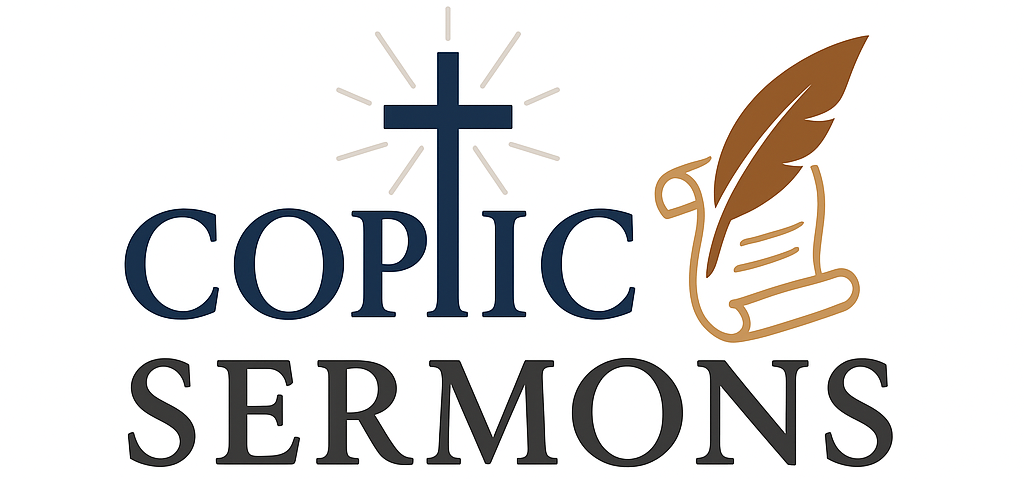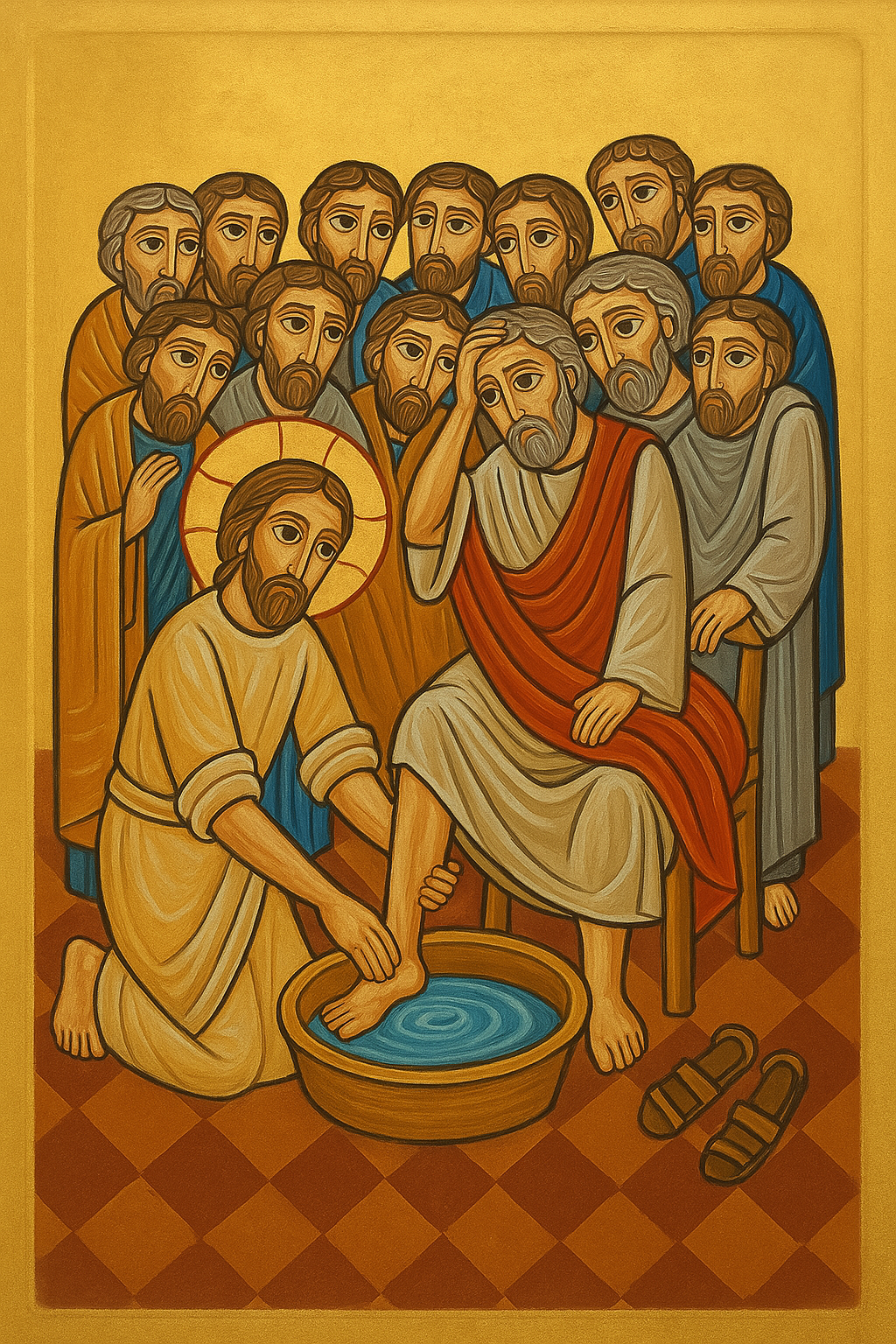In the Upper Room: Where Heaven Bends to Wash Feet and Break Bread — Covenant Thursday.
In the Name of the Father, and the Son, and the Holy Spirit, One God. Amen. May the blessing of the Lord who stooped low to lift us high, who broke bread to bind us in covenant, and who washed feet to cleanse hearts, be with us all. Amen.
Introduction
My beloved, on this most holy day, the Thursday of the Covenant, we do not simply remember an event—we are called into participation. This is the day our Lord performed acts so rich, so mysterious, that even eternity bends low to comprehend them. In one evening, the Son of God did not give us lofty teachings but embodied divine love: He rose to wash, He broke to give, and He prayed to unite. This sermon will journey through the three divine blessings that our Lord gave us on this day:
- The elevation of the soul in the Upper Room.
- The descent of humility in the washing of feet.
- The union of love in the Holy Eucharist. May your heart not only hear but be pierced and lifted by the Word.
The Upper Room – Where the Soul is Lifted
“Then he will show you a large upper room, furnished and prepared; there make ready for us.” (Mark 14:15, NKJV)
The Upper Room was not chosen by chance. It was a deliberate setting—a high place—elevated above the dust and distraction of the city. Christ did not want to share this mystery in the marketplace or in the synagogue. No, He called them up. The Upper Room symbolizes the invitation for our hearts and minds to rise—just as Moses ascended Mount Sinai to receive the commandment/convenient and as Elijah stood in silence before the whisper of God.
Why did He take them to an upper room? Because the mysteries of God are not discerned in the noise. You must leave behind the crowd, the noise of ambition, the clamor of jealousy, the distractions of your own ego. As the disciples climbed the stairs, they left behind their arguments about who is greatest (Luke 22:24). The ascent was more than physical—it was spiritual. Our Lord desires to speak not to the flesh, but to the soul, elevated, ready to receive.
St. Cyril of Alexandria teaches:
“Those who meet the Lord in the upper room seek all that is lofty in virtue. They seek the things to come, while still walking on the earth.”
The Upper Room is a heavenly invitation. It is a place of intimacy. A place where God removes the veil. A place where Christ gives not only bread—but Himself.
So go, O my soul, go with the One who bears the jar of water (Luke 22:10). Follow Him beyond your pride, beyond your anxiety, beyond your sin. Climb to meet the One who waits with the towel and the bread, with the prayer and the covenant. In the Upper Room, everything is prepared. For you.
The Basin and the Towel – The Depth of Divine Humility
“Jesus… rose from supper and laid aside His garments, took a towel and girded Himself. After that, He poured water into a basin and began to wash the disciples’ feet…” (John 13:4–5, NKJV)
Here is the God who bends. The One who stoops. Not under the weight of the Cross—yet—but under the filth of our dust. And He does not wash with disdain. He kneels with joy. The same hands that fashioned galaxies, that wrote the Law on Sinai, that healed blind men—those same hands now wash feet. Feet that will run away in fear. Feet that have walked into temptation. Feet that belong to men who will soon sleep through His agony.
What kind of love is this? What kind of humility?
Peter resists: “You shall never wash my feet.” And Jesus responds with the deepest mystery: “If I do not wash you, you have no part with Me.” (John 13:8)
My brothers and sisters, have you let Him wash you? Not just your feet, but your thoughts? Your ambitions? Your private guilt? To be part of Him is to be washed by Him. To be united with Him is to surrender to the touch of the Divine Humility.
And still, He washed Judas.
St. Jacob of Serugh, with tearful awe, said:
“He knew the tares among the wheat, yet He did not withhold the rain.”
This is love. Not just to serve the good, but to offer mercy to the hardened. Christ washed the feet of His betrayer. He gave him a seat. He gave him a share. He gave him a chance.
And what of us? Will we be like Peter—ashamed and yet drawn in—or like Judas—unmoved and plotting? The towel was not for show. It was a call. A call to those who serve. A call to us, the Church. If He has done this for us, how shall we treat each other?
Humility is not weakness. It is divine strength bowed in love. When you lower yourself to forgive, to serve, to reconcile—you walk in the steps of the One who knelt with a basin and a towel.
The Eucharist – The Mystery of Divine Nourishment
“And as they were eating, Jesus took bread, blessed and broke it, and gave it to the disciples and said, ‘Take, eat; this is My body.'” (Matthew 26:26, NKJV)
Nothing was ever the same after this. In the breaking of the bread, eternity cracked open. This is the Mystery of Mysteries—the holy Eucharist, the Feast of Union. In it, the Church does not merely remember Christ. She receives Him.
Let us go back to Genesis. Melchizedek, king of Salem, priest of God Most High, offered bread and wine. A foreshadowing. And now, the True High Priest offers not symbol—but substance. Not bread and wine—but His own flesh and blood.
“This is My body… this is My blood of the new covenant, which is shed for many for the remission of sins.” (Matthew 26:28)
The New Covenant. Sealed not with ink, but with blood. Initiated not on stone, but in hearts. This covenant fulfills all others. With Adam, Noah, Abraham, Moses—each covenant carried a promise. But this one carries a Person.
Every time the Church gathers around the altar, every time the priest raises the paten and chalice, every time the Body and Blood are lifted—we are there. We are in the Upper Room. We are at the foot of the Cross. We are before the Throne. This is not memory—it is presence.
Do you grasp this? The altar is heaven’s door opened wide. The Eucharist is Christ Himself entering your soul, nourishing it, binding it to Him. Do not come coldly. Do not come distracted. Come trembling. Come joyful. Come like a bride to her Groom.
“Whoever eats My flesh and drinks My blood abides in Me, and I in him.” (John 6:56)
How beautiful is our Church, who nourishes her children every day from this mystery. Who lives not by programs or buildings, but by the Body of the Crucified. O Church, blessed are you who eat the Lamb and drink the Cup and become one with the Eternal.
Three Processions – A Divine Invitation
On this day, there are three processions…
1. The Procession of Judas – The Descent into Darkness
“Having received the piece of bread, he then went out immediately. And it was night.” — John 13:30 (NKJV)
Meaning:
Judas had been present for everything: the washing of feet, the breaking of bread, and even the whispered love of the Upper Room. Yet, in his heart, betrayal had already begun. When he took the bread and left, he walked out of communion—literally and spiritually—into darkness.
Why is it a “procession”?
Because his departure was deliberate, final, and tragic—a turning of the back on love itself. This represents all those who choose sin knowingly and walk away from grace.
2. The Procession of the Towel – The Journey of Humble Repentance
“If I do not wash you, you have no part with Me.” — John 13:8 (NKJV)
“For I have given you an example, that you should do as I have done to you.” — John 13:15 (NKJV)
Meaning:
This represents those who stayed—like Peter who first resisted but then submitted. They allowed Christ to wash them, even though they were unworthy. They would later scatter and fail Him (Matthew 26:31), but they returned with tears. This procession is marked by humility, brokenness, service, and eventual restoration.
Why a “procession”?
Because it is a way of walking behind Christ—not proud, but limping. Not perfect, but repentant. It is the procession of all the saints who served with towels, not crowns.
3. The Procession of the Bread – The Path of Union and Communion
“Take, eat; this is My body… Drink from it, all of you.”— Matthew 26:26–27 (NKJV)
“He who eats My flesh and drinks My blood abides in Me, and I in him.”— John 6:56 (NKJV)
Meaning:
This is the most intimate procession. Those who partake of the Eucharist not only receive Christ but are transformed by Him. They don’t just witness the mystery—they enter it. These are those who accept the covenant, carry it, and become His body on earth.
Why is this a procession?
Because every time we receive communion worthily, we step into the ongoing movement of salvation, becoming one with Christ and joining the heavenly hosts.
The Final Question: “Which procession are you in?”
This is a personal spiritual examination:
- Are you with Judas, leaving the altar cold and unchanged?
- Are you with Peter, hesitant but open to be washed, falling but getting up again?
- Are you with John, leaning on His chest, receiving His Body and carrying His presence?
A Final Invitation – Enter the Upper Room
O my soul, do not remain at the doorway. Enter the Upper Room. Let Him lift you. Let Him wash you. Let Him feed you. Let Him pray over you. Be renewed in this holy covenant—not in name only—but in living fire. Tonight is the night when love stoops, when divinity kneels, when eternity is placed into your hands. How will you respond?
“Behold, I stand at the door and knock…” (Revelation 3:20)
May the Lord bless us, transform our hearts and minds, that our homes may stand on the Rock, our hands serve in the harvest, and our hearts long for Heaven. Amen.

